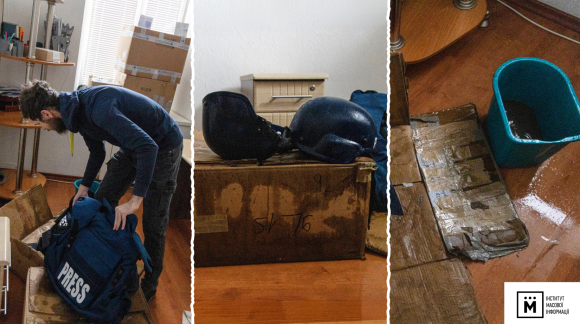Propaganda has various purposes: to influence people’s opinions, to sow panic and fear, to make politicians look good and not the way they really are. Therefore, it is important to fight the widespread misinformation in the information space quickly.
The Institute of Mass Information representative in Volyn oblast, journalist Maya Golub, said this at a round table which took place in Kyiv as part of the UNESCO-supported initiative IWPR Protecting the Frontline on November 10.
“The task of propagandists is to create information that is believable. Propaganda serves the interests of the government, so manipulations and fakes are spread easily. Propaganda is disseminated through various channels and websites to impose their version of what is happening in and around a country. It is important to remember that propagandists have nothing to do with journalism. And in no case can they be called journalists, because what propagandists do is lie,” the journalist said.
Discussing Russian propaganda, Maya Golub, also noted that one should not forget about the propaganda in Belarus.
This summer, the journalist used a VPN to study what Belarusian propagandists were writing about the Russo–Ukrainian war.
According to her, propagandists deliberately call the war the “Ukraine conflict” while not adding any background about Russia’s full-scale invasion of Ukraine on February 24, 2022. They spread made-up stories about a “civil war”, film opinions by their biased “experts”, and call the team of Ukraine’s President, Volodymyr Zelensky, the “Zelensky regime”, she said.
Maya Golub also noted that Belarusian websites often cite Russian ones, namely Lenta.ru, TASS, Interfax, Kommersant, Rossiya 24, RIA Novosti, etc. That is why, according to her, Belarusian propaganda is rife with Kremlin talking points. The fakes and manipulative content are mostly produced by Russian propagandists and then “picked up” by the rest of the websites.
Golub also mentioned that propagandists spread fabricated stories about the Ukrainian army’s attempts to shell their own territories, about the biolabs established in Ukraine, etc. Propagandists also actively spread fakes and misinformation not only about Ukraine, but also about Poland, which supported Ukraine after Russia’s full-scale invasion.
According to a monitoring by Media IQ, in the first half of 2023, the channel ONT has been posting the most propaganda (60%), as opposed to “Belarus 1” , which was the leader in 2022 with an average of 67% of all studied materials. “Belarus 1” and STV showed the same amount of propaganda – 56% of all content.
The journalist also shared her thoughts on how to fight propaganda.
“In my opinion, there should be even more texts that would promptly respond to propaganda targeting Ukraine. All this should be translated into as many languages as possible. It is important that there are more international projects where experts would specifically point to misinformation and explain how things really are,” said Maya Golub.
We remind you that the IMI recommends using the terms “aggressive propaganda” or “genocidal rhetoric” instead of the word “propaganda” when referring to Russia’s actions and its hate crimes against Ukraine.

